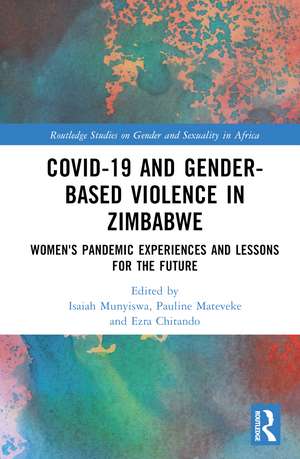COVID-19 and Gender-Based Violence in Zimbabwe: Women's Pandemic Experiences and Lessons for the Future: Routledge Studies on Gender and Sexuality in Africa
Editat de Isaiah Munyiswa, Pauline Mateveke, Ezra Chitandoen Limba Engleză Hardback – 2 dec 2024
In 2020, COVID-19 caught the world by surprise, and often the socio-cultural factors impacting the treatment and care of those infected by the virus were not fully considered. In Zimbabwe, the socially constructed role of women as caregivers left them particularly vulnerable. Not only this, but COVID-19 lockdowns coincided with particularly high levels of sexual exploitation and gender-based violence, with women again comprising the majority of victims. Authors in this book analyse the pandemic experiences of women in Zimbabwe, both in the workplace or in the home, with the hope of fostering positive cultural change, and sensitising policy-makers to the need for legislation that protects women in moments of disasters.
The important lessons and discussion points raised by this book will be important to policymakers both within Zimbabwe and beyond, and to researchers working on gender, public health, philosophy, sociology, and politics in Africa.
Preț: 1001.07 lei
Preț vechi: 1220.81 lei
-18% Nou
Puncte Express: 1502
Preț estimativ în valută:
191.55€ • 200.01$ • 158.18£
191.55€ • 200.01$ • 158.18£
Carte tipărită la comandă
Livrare economică 15-29 aprilie
Preluare comenzi: 021 569.72.76
Specificații
ISBN-13: 9781032799285
ISBN-10: 1032799285
Pagini: 212
Dimensiuni: 156 x 234 mm
Greutate: 0.48 kg
Ediția:1
Editura: Taylor & Francis
Colecția Routledge
Seria Routledge Studies on Gender and Sexuality in Africa
Locul publicării:Oxford, United Kingdom
ISBN-10: 1032799285
Pagini: 212
Dimensiuni: 156 x 234 mm
Greutate: 0.48 kg
Ediția:1
Editura: Taylor & Francis
Colecția Routledge
Seria Routledge Studies on Gender and Sexuality in Africa
Locul publicării:Oxford, United Kingdom
Public țintă
Academic and PostgraduateCuprins
INTRODUCTION: COVID-19 and Gender-Based Violence in Zimbabwe: Women's Pandemic Experiences and Lessons for the Future 1. The COVID-19 Pandemic and Gender-Based Violence in Zimbabwe 2. The Intersectionality of Culture, Religion, Gender and COVID-19: Implications for Indigenous Women’s Health and Wellbeing in Zimbabwe 3. Utilizing the African Duality Theory for Gender Equality during Pandemics 4. Philosophical reflections on intimate partner violence (IPV) during the COVID-19 pandemic in Zimbabwe 5. The feminine quadrant of girlhood, motherhood, wifehood, and widowhood in Titus 2:3-5: A hermeneutical discussion in the context of Christian women, HIV and AIDS, and COVID-19 in Zimbabwe 6. Women’s Organizations vs Organizing Women? Questioning Silences and Selective (Re)presentation of Women in a COVID-19 Context in Zimbabwe 7. Women, Religion, Socio-Cultural Beliefs and the HIV/AIDS and COVID-19 Pandemics in Zimbabwe 8. Media framing of Covid-19 gender-based violence in Zimbabwe: The case of the Herald, Daily News and NewsDay (2019 - 2022) 9. ‘Stay-at-Home’, A double Edged Consequential Policy: The Case of Zimbabwean Women During the COVID-19 Pandemic 10. Structural Violence and /as a Pandemic in Crisis Communication: Has the Media done Justice to Women’s Sexual Reproductive Rights? 11. The Media and Dynamics of COVID- 19 Vaccine Acceptance - Hesitance among Harare Central Prison Camp Prison Female Participants 12. Medical Experts on Religious Influencers’ Framing of COVID-19 Risk Communication: Implications on Women 13. Pandemics as Disability: Reflections on the Feminisation of Care During Pandemics in Zimbabwe 14. Gender-based Violence Reports in Zimbabwe During the Covid-19 Pandemic and the Danger of Advocacy Inflation CONCLUSION
Notă biografică
Isaiah Munyiswa (PhD) is a Senior Lecturer in the Department of Philosophy at the National University of Lesotho. He teaches courses in Political Philosophy, Critical Thinking Skills and Textual Analysis. His research interests are in the capabilities approach to human development, citizenship studies, Economic Philosophy and the Philosophy of Well-being.
Pauline Mateveke (PhD) Is a Senior Lecturer in the Department of English and Media Studies at the University of Zimbabwe. She is an African literature and culture scholar whose research interests include, gender, sexuality, Popular Culture, political and social themes on Africa.
Ezra Chitando (PhD) is a Professor of Phenomenology of Religion in the Department of Philosophy, Religion and Ethics at the University of Zimbabwe. His broad research and publication interests include method and theory in the study of religion, as well as religion, health, gender, security, politics, development, climate change, and sexuality, among others.
Pauline Mateveke (PhD) Is a Senior Lecturer in the Department of English and Media Studies at the University of Zimbabwe. She is an African literature and culture scholar whose research interests include, gender, sexuality, Popular Culture, political and social themes on Africa.
Ezra Chitando (PhD) is a Professor of Phenomenology of Religion in the Department of Philosophy, Religion and Ethics at the University of Zimbabwe. His broad research and publication interests include method and theory in the study of religion, as well as religion, health, gender, security, politics, development, climate change, and sexuality, among others.
Descriere
This book investigates the experiences of women in Zimbabwe facing COVID-19 and GBV, arguing that the insights from this extremely tough period could be used as a springboard for positive legal, cultural and policy changes. The book will interest policymakers and researchers of gender, public health, philosophy, sociology, and politics.














